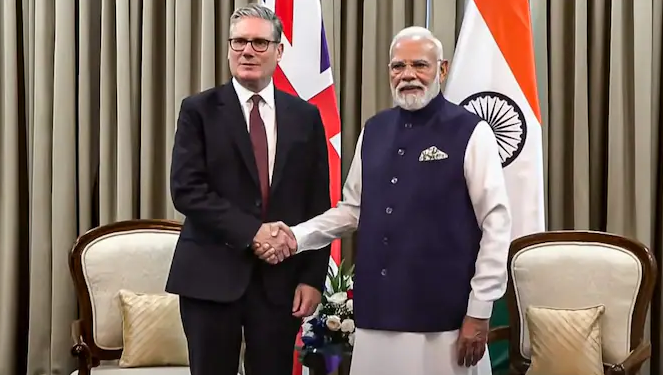A Strategic Visit, Big-Ticket Outcomes
UK Prime Minister Sir Keir Starmer’s two-day trade mission to India from 8–9 October 2025 marked a significant evolution in UK–India economic ties. Accompanied by a 125-strong British business, academic and cultural delegation, the visit underscored how the recently signed India–UK Comprehensive Economic and Trade Agreement (CETA) is now shifting from paper to practice.
On the Indian side, Prime Minister Narendra Modi joined Starmer in public events in Mumbai, including the Global Fintech Fest, to showcase how the two economies intend to deepen collaboration in technology, manufacturing, defence, services and education.
The Numbers That Snap Heads
One of the standout announcements: British companies confirmed £3.6 billion worth of new investments into India.
A UK government press-release noted “29 investments into India worth over £3.6 billion” during the visit.
Some flagship commitments include:
Graphcore (part of SoftBank) will invest up to £1 billion in a new AI engineering campus in Bengaluru, creating about 500 high-skilled jobs in India’s semiconductor/AI ecosystem.
Tide (a UK fintech) will deploy £500 million in its India operations over the next five years (starting 2026), expanding its Indian workforce to ~2,300.
Revolut is expected to invest £500 million in its India business over five years.
At the same time, Indian investment into the UK was also highlighted: around £1.3 billion from 64 Indian companies, expected to create some 6,900 jobs in the UK.
In total, the visit produced over 10,600 jobs (in the UK) and multi-billion-pound commitments in both directions—an impressive bilateral scorecard.

Why It Matters
For your context (especially since you’re involved in digital services and cross-border work), a few key take-aways:
The CETA provides the framework for tariff cuts, smoother investment flows and easier access for UK firms into India, and vice-versa. That means more opportunities for tech, ERP, digital marketing, services exports.
The fact that major UK-based tech/fintech players are investing into India (not just exporting) indicates India is now being leveraged as a hub for R&D, engineering and services. That suggests opportunity for collaborations, outsourcing, joint ventures.
With the UK delegating such a large trade mission (125 business/edu/culture leaders) this signals serious institutional support—not just symbolic.
For India, having British institutional players commit large sums helps build the narrative of India as a destination not only for FDI but for global scale-ups and innovation-led business.
The Strategic Angle
Beyond deals and dollars, this visit pointed to deeper shifts:
Technology & AI: The Graphcore deal, joint India-UK centres for AI, critical minerals, 6G/telecom cybersecurity are all signposts for next-gen collaboration.
Defence & manufacturing: The UK will supply missiles to India (worth £350 m, creating 700 UK jobs) and there are discussions around co-production and shared supply-chains.
Education & services: UK universities preparing to open campuses in India, cultural/business linkages expanding. This widens the scope of the “trade” conversation beyond pure goods.
Implications for India’s Service-/Digital Economy
Given your focus on Odoo, website-development, digital marketing, CRM/ERP:
UK firms expanding into India means demand for Indian tech/engineering talent, offshore services, joint ventures—your domain could map into that.
With India being positioned as a “hub” for AI/fintech/semiconductors, project opportunities (both offshore and near-shore) may increase.
The bilateral framework (tariffs, trade deal) reduces barriers for British-Indian joint ventures, which means more multinational digital service business potentially.
The large influx of investment also drives demand for support services: digital infrastructure, local operations, compliance/ERP implementation in India for global firms setting up.
From a marketing angle: Indian firms (services/tech) can position themselves more credibly as “UK ready” or “UK-India collaborative” to capitalise on this momentum.
The Road Ahead – A Few Things to Watch
Implementation: Deals have been announced; the real test will be delivery—whether the £3.6 billion investments materialise, how many jobs are created and how effectively the operations scale.
Regulatory & operational risk: Setting up in India still involves navigating local regulation, GST, labour issues, land/office infrastructure. UK firms will watch closely.
Supply-chain dynamics: As India becomes more of a global manufacturing/engineering hub, issues like supply-chain resilience, components sourcing, critical minerals sourcing come up (UK-India critical minerals collaboration mentioned).
Service-sector momentum: Will this translate to measurable growth in Indian-UK digital services exports, outsourcing or near-shoring? That’s a space where you operate and could benefit.
The “people and talent” dimension: While the trade deal focuses on goods and services, talent mobility, visas, skills recognition remain important. The visit sidestepped major visa breakthroughs.
Bottom Line
Prime Minister Starmer’s visit to India has produced tangible results: £3.6 billion in UK business commitments into India, major Indian investment into the UK, and a strengthened strategic partnership anchored by technology, services and trade. It signals a shift from talk to action in UK-India economic relations.
For people in the digital services, ERP/CRM space (like you), this is important — it means more cross-border opportunity, more UK-India business flows, and a trading environment that may open up faster. We’re seeing a “now or soon” moment, not just a future promise.
-
About The Founder
View all posts
Mr. Amit Badia, the proprietor of Abinfocom started his career with computer Warehouse in 1993 just after finishing his graduation. A keen learner, he has developed his expertise in the virtual world at his own. Amit has always been an ardent believer of expanding the knowledge horizon without depending on any source. He never limits or restricts any domain but always work upon things to connect it with other domains to practically show the utility of every business.Recent Posts
Views: 0


